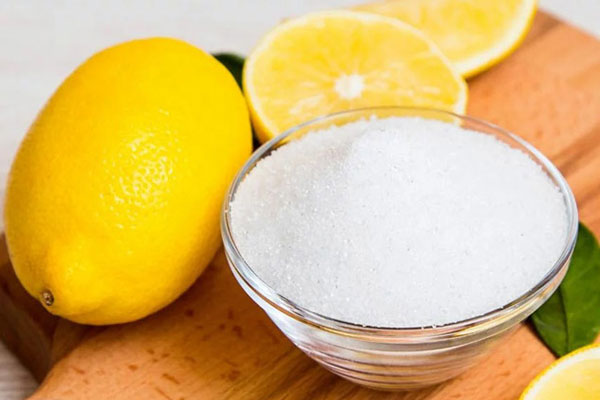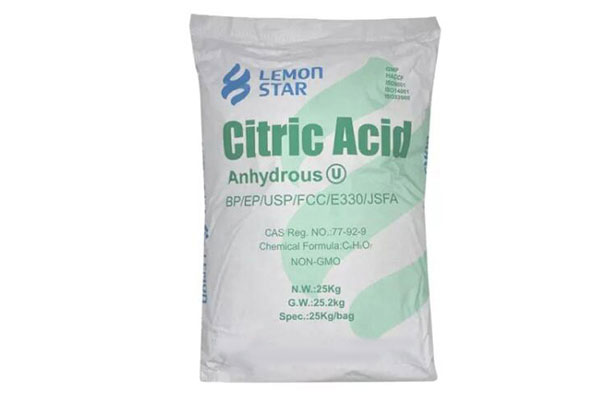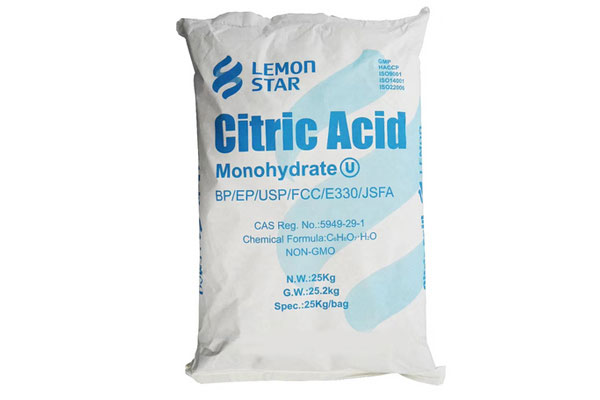Home » Citric Acid Supplier

China Citric Acid Supplier - Chemate
- Appearance: White Crystalline Powder, Colorless Crystals or Granules
- Forms: Anhydrous & Monohydrate
- CAS No.: 77-92-9
- HS Code: 29181400
- Molecular Formula: C6H807, C6H807·H20
If you are planning to purchase citric acid powder in bulk, the the price will be one of the factors you will have to consider. Secondly, when you plan to import, finding a highly reputable citric acid supplier is also the most important factor you must consider. For that, this kind of long-distance cooperation might appear a lot of unexpected problems. Choosing Chemate – a professional citric acid manufacturer with rich export experience will help avoid many problems and provide timely and perfect solutions when encountering emergencies. Meanwhile, the quality of our products can also withstand professional testing. Feel free to inquiry us for the bulk citric acid price now.



What Is Anhydrous Citric Acid
Anhydrous citric Acid is crystallized from hot water. Citric acid content is an important indicator to measure the quality of anhydrous citric acid powder, which is generally required to be above 99.5%. Moisture content is one of the key factors affecting the quality of citric acid anhydrous. It is generally required now to be exceed 0.5%.
| Item | Unit | Quality Standards | Analysis Results |
| Characters | — | White or almost white, crystalline powder, colourless crystals or granules. Odorless, has a strongly acid taste. effloresces in dry air. Very soluble in water, freely soluble in ethanol. | Pass |
| Identification | — | Pass Test | Pass |
| Appearance of solution | — | Pass Test | Pass |
| Assay | % | 99.5~ 100.5 | 99.8 |
| Water | % | ≤0.5 | 0.15 |
| Readily Carbonisable Substances | — | Pass Test | Pass |
| SulphatedAsh (Residue on Ignition) | % | ≤0.05 | 0.02 |
| Sulfate | mg/kg | ≤150 | <150 |
| Oxalate | mg/kg | ≤100 | <100 |
| Lead | mg/kg | ≤0.5 | <0.2 |
| Arsenic | mg/kg | ≤1.0 | <0. 1 |
| Mercury | mg/kg | ≤1.0 | <0.5 |
| Aluminium | mg/kg | ≤0.2 | <0.2 |
| Heavy Metals | mg/kg | ≤5.0 | <5.0 |
| Bacterial endotoxins | IU/mg | <0.5 | <0.5 |
| Conclusion:The product is in conformity with BP/USP/FCC/E330 | |||
Would Like The Quotation
Leave more about your requirements, such as, tech grade or food grade, quantity, package, country, etc.
What Is Monohydrate Citric Acid
Monohydrate citric acid is crystallized from cold water. Monohydrate type can be converted into anhydrous type by debonding water at around 78℃. The same as anhydrous citric acid, the citric acid content of citric acid monohydrate is also above 99.5%. However, the moisture content of monohydrate citric acid powder is generally between 7.5% and 8.8%.
| Item | Unit | Quality Standards | Analysis Results |
| Characters | — | White or almost white, crystalline powder, colourless crystals or granules. Odorless, has a strongly acid taste. effloresces in dry air. Very soluble in water, freely soluble in ethanol. | Pass |
| Identification | — | Pass Test | Pass |
| Appearance of solution | — | Pass Test | Pass |
| Assay | % | 99.5~ 100.5 | 99.9 |
| Water | % | 7.5~ 8.8 | 8.69 |
| Readily Carbonisable Substances | — | Pass Test | Pass |
| Sulphated Ash (Residue on Ignition) | % | ≤0.05 | 0.02 |
| Sulfate | mg/kg | ≤150 | <150 |
| Oxalate | mg/kg | ≤100 | <100 |
| Lead | mg/kg | ≤0.5 | <0.05 |
| Arsenic | mg/kg | ≤1.0 | <0.3 |
| Mercury | mg/kg | ≤1.0 | <0.5 |
| Aluminium | mg/kg | ≤0.2 | <0.2 |
| Heavy Metals | mg/kg | ≤5.0 | <5.0 |
| Bacterial endotoxins | IU/mg | ≤0.5 | <0.5 |
| Conclusion:The product is in conformity with BP/USP/FCC/E330 | |||
Would Like The Quotation
Leave more about your requirements, such as, tech grade or food grade, quantity, package, country, etc.
Packaging of Powdered Citric Acid
Net 25kg /Kraft bag, 25MT/ 20’FCL
Net 25kg /Carton,20MT / 20’FCL
Net 500kg or 1000kg PP woven Jumbo bags
Would Like The Quotation
Leave more about your requirements, such as, tech grade or food grade, quantity, package, country, etc.
What Is Citric Acid Powder
Citric acid, also known as lemon acid, is a weak organic acid with the chemical formula of C6H8O7. Citric acid is a naturally occurring acid found in a variety of fruits and vegetables. Citric acid can exist in anhydrous or monohydrate form. The crystal form of citric acid varies due to different crystallization conditions. It can be decomposed into a variety of products when heated and can react with acids, alkali, glycerol, etc.
As a versatile organic acid, granular citric acid has a wide range of applications, from food and beverages to pharmaceuticals and cleaning products. It is safe and considered a natural chemical as it is found in many natural ingredients. In the food and pharmaceutical industries, citric acid is usually supplied in powder or crystal form.
Food Grade Citric Acid
Because food grade citric acid has a mild and refreshing sour taste, it is widely used in the manufacture of various beverages, sodas, wines, candies, snacks, biscuits, canned juices, dairy products and other foods. Among all organic acids in the market, citric acid accounts for more than 70% of the market. So far, there is no sour agent that can replace citric acid.
As an edible acid, citric acid can enhance normal metabolism in the body and is harmless to the human body in appropriate doses. Adding lemon acid to some foods tastes good and can increase appetite. However, food grade citric acid can have a negative impact on calcium metabolism. Therefore, eat a small amount and pay attention to calcium supplements, especially for children. In addition, granular citric acid can’t be added to pure milk, otherwise it will cause the pure milk to coagulate.
What Are Applications of Citric Acid For Food
Citric acid is the largest organic acid produced by biochemical methods in the world. Citric acid and salts are one of the pillar products of the fermentation industry and are mainly used in the food industry, such as sour agents, solubilizers, buffers, antioxidants, deodorizer, flavor enhancer, gelling agent, toner, etc.
Used as food sourness regulator. Citric acid is a natural sourness regulator that can be used to adjust the acidity and taste of food. Citric acid powder is an important acidity regulator in beverages, juices, yogurt, preserves and other foods.
Used as food preservative. Citric acid acts as a natural preservative and can be used to maintain the freshness and quality of food. It is a commonly used preservative in pastries, bread, cheese, seasonings and other foods.
As food emulsifier. Citric acid acts as an emulsifier and can be used to adjust the consistency and texture of foods. The food additive is a commonly used emulsifier in foods such as ice cream, cream, and chocolate.
As food acidifier. It can be used to increase the acidity and taste of food. In foods such as jam, fruit vinegar, and sauerkraut, citric acid is a commonly used acidifier, accounting for about 2/3 of the total consumption of sour agents. Adding citric acid to canned fruits can maintain or improve the flavor of the fruit, increase the acidity of some fruits with lower acidity when canned, weaken the heat resistance of microorganisms and inhibit their growth, and prevent the growth of fruits with lower acidity.
Used as food antioxidants. Citric acid can be used as a natural antioxidant. Its chelating effect and pH adjustment properties enable it to increase antioxidant performance, inhibit enzyme activity, and extend the shelf life of food in the processing of quick-frozen foods. Citric acid is a commonly used antioxidant in meat products, soy products, biscuits and other foods.
Citric acid is widely used in the food industry. It can not only improve the taste and quality of food, but also extend the shelf life of food. However, it should be noted that the amount of citric acid used in food should be controlled within an appropriate range to avoid adverse effects on human health.
Applications in Industrial Fields
Used in water treatment industry. Citric acid has the functions of sterilizing and adjusting the pH value of water in water treatment. Its acidity can change the pH of cells and affect the normal metabolism of bacteria. Acidic high concentrations of hydrogen ions can also alter bacterial biological activity and directly damage cells.
Used in chemical reagents. In chemical technology, citric acid can be used as a reagent for chemical analysis, experimental reagents, chromatographic analysis reagents and biochemical reagents. It can also be used as a complexing agent and masking agent to prepare buffer solutions.
Used in detergents. Using citric acid or citrate as a builder can improve the performance of washing products, quickly precipitate metal ions, prevent pollutants from reattaching to fabrics, maintain the necessary alkalinity for washing, disperse and suspend dirt and ash, so as to improve surfactant performance. Citric acid can also be made into a formaldehyde-free anti-wrinkle finishing agent, which can be used for anti-wrinkle finishing of pure cotton fabrics.
Used in cosmetics, citric acid has the effect of preventing and eliminating skin pigmentation. Citric acid is a type of fruit acid. Its main function is to accelerate the renewal of cuticles. It is often used in lotions, creams, shampoos, whitening products, anti-aging products, acne products, etc.
Used as additive for poultry and livestock. Adding citric acid to piglet feed can lead to early weaning, increase feed utilization by 5% to 10%, and increase sow litter size. Adding 1% to 2% citric acid to the diet of growing and finishing pigs can increase daily weight gain, reduce feed-to-meat ratio, increase protein digestibility, reduce back fat thickness, and improve meat quality and carcass characteristics.
Used in fungicides. Citric acid has a good effect on killing bacterial spores, and can effectively kill bacterial spores contaminated in the pipelines of hemodialysis machines.
Used in the pharmaceutical industry. Citric acid, also known as citrate, requires calcium ions to participate in the formation of prothrombin activator and subsequent coagulation process. Citrate ions and calcium ions can form a soluble complex that is difficult to dissociate, thus reducing the concentration of calcium ions in the blood and hindering blood coagulation. Used as an extracorporeal anticoagulant during blood transfusions or laboratory blood sample anticoagulation.
More About Citric Acid
Physical and chemical properties of Citric Acid
Soluble in water, ethanol, ether, insoluble in benzene, slightly soluble in chloroform. The aqueous solution is acidic.
At room temperature, citric acid appears as colorless translucent crystals, white particles or white crystalline powder. It is odorless, extremely sour, and slightly deliquescent in humid air.
It can exist in the form of anhydrous citric acid or monohydrate citric acid. When citric acid crystallizes from hot water, it forms anhydrous. When it crystallizes from cold water, it forms monohydrate. The monohydrate decomposes to the anhydrate when heated to 78 °C. At 15°C, citric acid can also be dissolved in absolute ethanol.
Is Citric Acid E330 Safe in Food
Citric acid E330 is fully compliant with food grade requirements, which has good performance in actual use, mainly in terms of safety. The raw materials for preparing citric acid are all derived from natural foods, so it is a safe food-grade microorganism.
How to Use Granular Citric Acid Correctly
- Determine the dosage of citric acid according to specific needs. Use citric acid powder or citric acid solution to add the appropriate amount of citric acid according to the recipe for making food, medicine, cosmetics or cleaning products.
- Pay attention to the storage of citric acid and store it in a dry and cool place to avoid moisture.
- When preparing food, ensure that citric acid is used in accordance with food regulations and safety standards.
- Although citric acid is generally considered safe, it still needs to be used according to the specific needs and guidance of the product. In industrial and commercial applications, relevant regulations and standards should be followed to ensure product quality and safety.
About Natural Lemon Acid
Natural citric acid is widely distributed in nature. Natural lemon acid is found in plants such as lemons, citrus, pineapples and other fruits, and in the bones, muscles, and blood of animals. Synthetic citric acid powder is produced by fermenting sugary substances such as sugar, molasses, starch, and grapes. Many fruits and vegetables, especially citrus fruits, contain high amounts of citric acid, especially lemons and limes. They contain large amounts of lemon acid, up to 8% after drying. This content varies with different cultivars and plant growth conditions.
How Is Citric Acid Prepared
Typically, farinaceous substance is the main source of citric acid. First, crush the farinaceous raw materials, then add an appropriate amount of water to the crushed raw materials and stir. The mixture is fermented, and the filtrate is obtained by filtration after fermentation. Calcium carbonate is added to the filtrate to cause neutralization reaction, and calcium citrate is filtered out. Calcium citrate is acidolyzed with sulfuric acid and filtered. The filtrate is decolorized by ion exchange, then concentrated, crystallized, and dried to obtain citric acid powder.
Buy Bulk Citric Acid from Chemate
If you plan to purchase citric acid powder in bulk, please feel free to contact us. We will give you the best wholesale price.
- Email: sales@chemategroup.com
- Tel: 0086-371-60921621
- Whatsapp: +86 18624832876
- Wechat: +86 18624832876
- ADD: NO.80 PUHUI ROAD,ZHENGZHOU CITY, HENAN PROVINCE, CHINA
